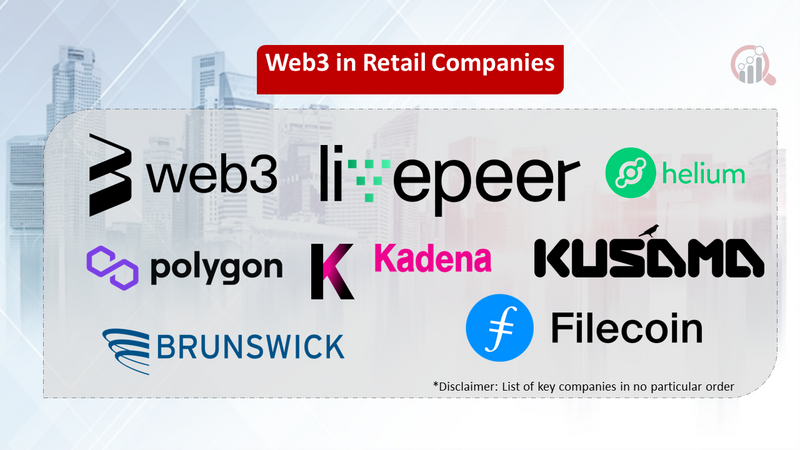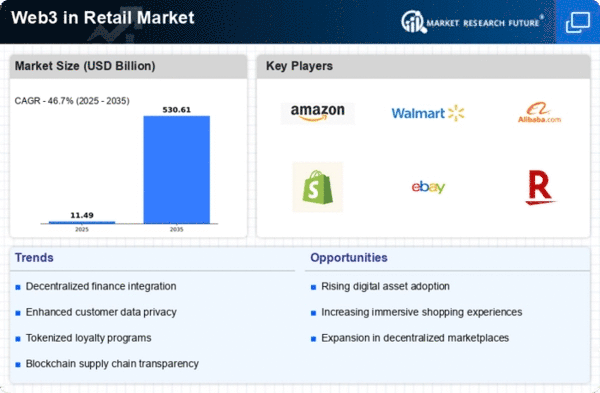Top Industry Leaders in the Web3 in Retail Market

The Competitive Landscape of Web3 in Retail: A Disruptive Dance
The retail industry is undergoing a transformative shift with the emergence of Web3, a decentralized, blockchain-powered ecosystem. This new landscape presents exciting opportunities for businesses to enhance customer experiences, build trust, and gain a competitive edge. However, navigating the complex Web3 landscape requires a clear understanding of the key players, their strategies, and the factors influencing market share.
Key Players:
-
Filecoin
-
Web3 Foundation
-
Zel Technologies Limited
-
Livepeer Inc
-
Brunswick Corporation
-
Helium Systems Inc
-
Kusama
-
Polygon Technology
-
Kadena LLC
-
Ocean Protocol Foundation Ltd
Strategies Adopted:
-
NFTs: Implementing NFTs for product ownership, loyalty programs, and exclusive content access is a popular strategy. This allows brands to build stronger customer communities and offer unique experiences.
-
Decentralized Marketplaces: Creating or participating in decentralized marketplaces enables direct peer-to-peer transactions between brands and consumers, reducing reliance on intermediaries and potentially lowering costs.
-
Metaverse Integration: Establishing a presence in the metaverse allows brands to reach a new audience and offer immersive shopping experiences. Virtual stores, interactive product demos, and exclusive metaverse events are gaining traction.
-
Tokenization: Tokenizing assets like loyalty points or product ownership can create new revenue streams and incentivize customer engagement.
Factors for Market Share Analysis:
-
First-mover advantage: Early adopters of Web3 technologies have the potential to establish brand recognition and secure a larger market share.
-
Technological expertise: Navigating the complexities of blockchain and Web3 requires specialized skills and resources. Companies with strong technical competence will be better positioned to succeed.
-
Ecosystem integration: Seamless integration with existing retail infrastructure and Web3 platforms is crucial for user adoption and scaling.
-
Consumer adoption: Ultimately, the success of Web3 in retail will depend on consumer acceptance and willingness to engage with new technologies and experiences.
New and Emerging Companies:
-
Decentralized brands: Companies built entirely on the blockchain, like Decentraland or Sandbox, offer unique experiences and challenge traditional retail models.
-
Web3 loyalty platforms: Platforms like Unlockd and Cocos allow brands to create tokenized loyalty programs and incentivize customer engagement through blockchain-based rewards.
-
Social commerce DAOs: DAOs like Orange DAO enable communities to co-own and manage retail businesses, creating a more collaborative and transparent approach to commerce.
Current Company Investment Trends:
-
Venture capital: VC firms are increasingly investing in Web3 startups, recognizing the potential for disruptive innovation in the retail sector.
-
Partnerships and acquisitions: Established retailers are partnering with Web3 startups and acquiring relevant technologies to accelerate their adoption.
-
Internal innovation: Many companies are setting up dedicated Web3 teams and investing in research and development to explore new opportunities and applications.
Latest Company Updates:
-
Nov 15, 2023: IBM and Maersk partner to develop a blockchain-based platform for tracking and verifying product provenance. -
Dec 20, 2023: Everledger launches a platform for tracking diamonds using blockchain technology, promoting ethical sourcing. -
Jan 17, 2024: L'Oréal pilots a blockchain-based project to track and trace sustainable ingredients in its products.










